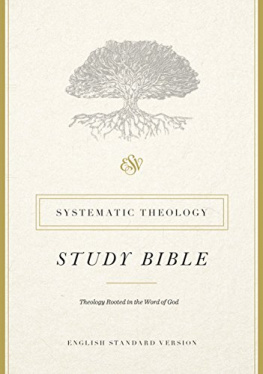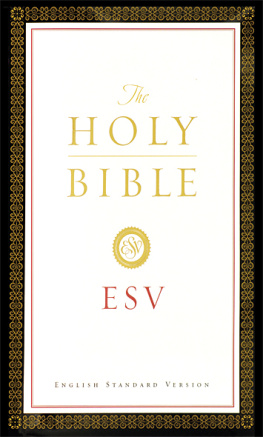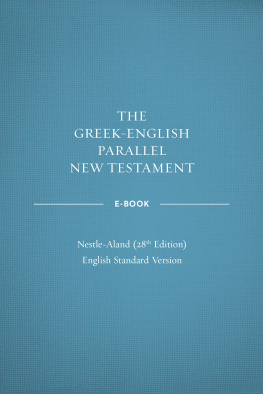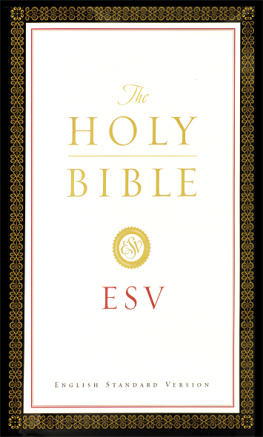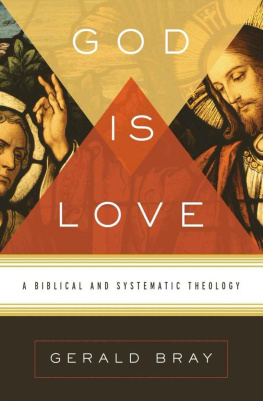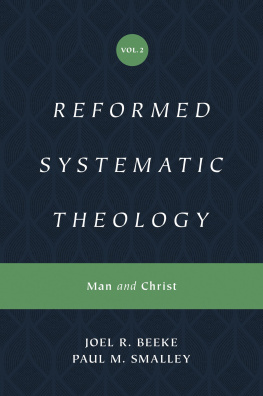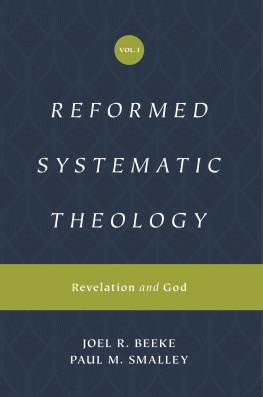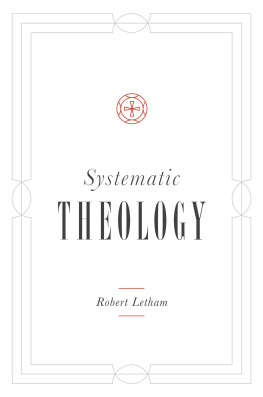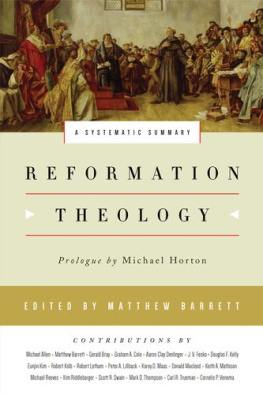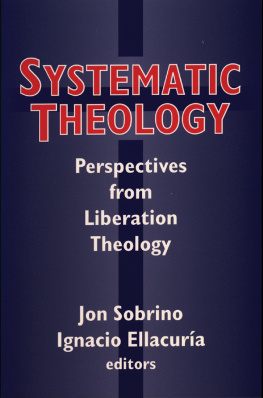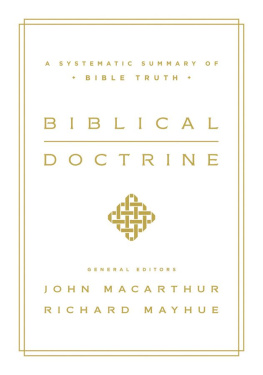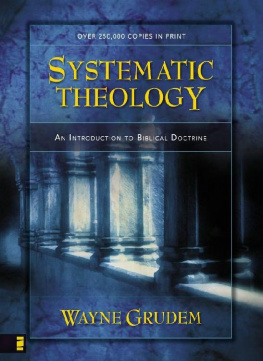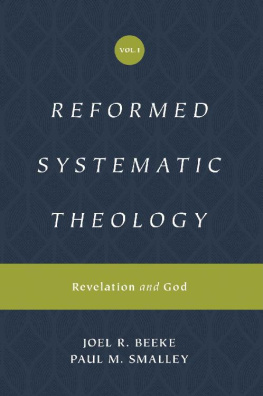Crossway - ESV Systematic Theology Bible Articles
Here you can read online Crossway - ESV Systematic Theology Bible Articles full text of the book (entire story) in english for free. Download pdf and epub, get meaning, cover and reviews about this ebook. year: 0, genre: Religion. Description of the work, (preface) as well as reviews are available. Best literature library LitArk.com created for fans of good reading and offers a wide selection of genres:
Romance novel
Science fiction
Adventure
Detective
Science
History
Home and family
Prose
Art
Politics
Computer
Non-fiction
Religion
Business
Children
Humor
Choose a favorite category and find really read worthwhile books. Enjoy immersion in the world of imagination, feel the emotions of the characters or learn something new for yourself, make an fascinating discovery.
ESV Systematic Theology Bible Articles: summary, description and annotation
We offer to read an annotation, description, summary or preface (depends on what the author of the book "ESV Systematic Theology Bible Articles" wrote himself). If you haven't found the necessary information about the book — write in the comments, we will try to find it.
ESV Systematic Theology Bible Articles — read online for free the complete book (whole text) full work
Below is the text of the book, divided by pages. System saving the place of the last page read, allows you to conveniently read the book "ESV Systematic Theology Bible Articles" online for free, without having to search again every time where you left off. Put a bookmark, and you can go to the page where you finished reading at any time.
Font size:
Interval:
Bookmark:

Apologetics
The Term Apologetics
The term apologetics has nothing to do with apologizing for anything. Typically we think of an apology as an admission of wrongdoing and a request for forgiveness. But presenting an apologetic is almost the very reverse of apologizing. An apologetic is rather a defense of what might appear to be wrong but actually is right. Rather than requesting forgiveness, an apologetic seeks to persuade someone that no forgiveness is needed, despite a wrongful accusation.
The term apologetics is related to the biblical word group apologeomai, apologia, usually translated defend, defense. In the NT, the term is used most often by the apostle Paul, when he defends himself against charges brought against him (Acts 22:1; 24:10; 25:8, 16; 26:12, 24). To defend himself against these charges, Paul defends the gospel, the good news about Jesus, which is his overall calling, the context of everything he does. Defending his preaching means defending the gospel of Jesus Christ. This is why in Philippians 1:7 Paul speaks of his whole apostolic ministry as the defense and confirmation of the gospel. It is that defense of the gospel that has landed him in prison (Phil. 1:16).
The Biblical Mandate for Apologetics
Peter generalizes to all believers the obligation to defend the gospel whenever nonbelievers question our faith:
In your hearts honor Christ the Lord as holy, always being prepared to make a defense [apologia] to anyone who asks you for a reason for the hope that is in you; yet do it with gentleness and respect. (1 Pet. 3:15)
This is the biblical mandate for apologetics. Peter says that all believers should be prepared to make a defense. We should note that he places this in two contexts: the context of Christs lordship and the context of the inquirer. The first context tells us that apologetics is an act of worship, not just a human conversation but a way of honoring Jesus as Lord. When we get into a discussion of the gospel with an unbeliever, we are often tempted to set Christ aside and focus on the common ground of reason and evidence. But we must never set Christ aside. Even in apologetics, our first responsibility is to please him.
The second context is also important. We are to defend the faith with gentleness and respect. Some Christians are attracted to the work of apologetics out of a desire to win a contest. Their purpose is to defeat unbelievers, to devastate them. God, however, calls us to respect them, to convince them gently, and therefore to love them, as Christ first loved us. In apologetics, we are called to image our Lord, not just to talk about him.
In the light of Peters mandate, we can define apologetics as the defense of the faith. As a theological science, it is the discipline by which we learn to give reasons for our hope, always honoring Christ and showing love for inquirers.
As such, apologetics is found throughout the Bible, not just in the relatively few passages that use apologeomai and its derivatives. Think of how often Jesus reasons with his Jewish opponents. The prophets and apostles regularly do the same, emulating him. Indeed, God himself reasons with those who question him: Come now, let us reason together, says the Lord (Isa. 1:18).
So the whole content of the Bible is apologetic, for all Scripture is the speech of God, and throughout the Bible God speaks apologetically: he engages in a rational attempt to change the beliefs and behavior of his readers (2 Tim. 3:1617). And, in all biblical apologetics, God honors his Son as holy and shows gentleness and respect to his readers.
As we seek to learn, then, the art and science of apologetics, the whole Bible will be our text. We shall try to follow the example, not only of Jesus and Paul as they deal with controversy, but of every part of Scripture as it defends its gospel message.
Scriptures Approach to Apologetics
The Bibles own apologetic approach can be conveniently divided into three aspects: (1) setting forth the truth with its rationale, (2) giving direct answers to objections, and (3) showing the foolishness of competing messages. We can distinguish these for convenience, but none of them is complete without the other two.
Setting Forth the Truth
The first of these is by far the most common, in which the Bible in various ways describes its message. What makes this description apologetic is that since the Bible is Gods Word, it always sets forth its message clearly and rationally. The story is believable to those who read it with open minds and hearts. But many readers are not open to what it says. That is part of the story too. Paul in Romans 1:18 tells us that many people by their unrighteousness suppress the truth. So we learn that when people hear the gospel, some reject it, even laugh at it (Acts 17:32). But others find themselves believing it, by a supernatural power (1 Thess. 1:5; 2:13).
Try this experiment: When Exodus 14:21 tells us that God divided the Red Sea so that Israel could cross through it, do you find that believable? Some people do. They believe in God, and this event, large as it is, easily seems to be the kind of thing God could do. But others find this account unbelievable, because such things just dont happen. This second kind of reader may believe that Gods existence is possible, but he does not allow God to determine what is possible and what is not. Rather, he determines what is possible by making some assessment of natural laws or rational probabilities. In effect he says, I will not allow God to determine what is possible; I must do that for myself. But to take that position is already to take the position of unbelief. And if this passage is true, the unbelieving reader suppresses that truth.
Answering Objections
But there are places where Scripture actually addresses skeptics of this kind, and that leads us to the second aspect of the Bibles apologetic: its direct answers to objections. Pauls letter to the Romans, for example, is filled with objections to his gospel: What advantage has the Jew? (Rom. 3:1); What if some were unfaithful? (Rom. 3:3); Is [God] unrighteous to inflict wrath on us? (Rom. 3:5); Why not do evil that good may come? (Rom. 3:8); Are we to continue in sin that grace may abound? (Rom. 6:1). The whole letter to the Romans is a dialogue between Paul and various objectors. In Romans 9: 1925 he confronts the problem of evil: Should we not charge God himself with evil, since he is himself the source of human disbelief?
You will say to me then, Why does he still find fault? For who can resist his will? But who are you, O man, to answer back to God? Will what is molded say to its molder, Why have you made me like this? Has the potter no right over the clay, to make out of the same lump one vessel for honorable use and another for dishonorable use? What if God, desiring to show his wrath and to make known his power, has endured with much patience vessels of wrath prepared for destruction, in order to make known the riches of his glory for vessels of mercy, which he has prepared beforehand for gloryeven us whom he has called, not from the Jews only but also from the Gentiles? As indeed he says in Hosea,
Those who were not my people I will call my people,
and her who was not beloved I will call beloved.
As with Exodus 14:21, some will find this answer credible, while others will not. Some readers will say, Yes, of course! God has full rights over us, for he is God. Others, however, will say, No! God must measure up to my standards of fairness, even when he judges sin and righteousness. The Christian apologist who enters this discussion will certainly go into much more argumentative detail than Romans 9 provides. But Scripture itself sets forth the basic direction the dialogue will take.
Font size:
Interval:
Bookmark:
Similar books «ESV Systematic Theology Bible Articles»
Look at similar books to ESV Systematic Theology Bible Articles. We have selected literature similar in name and meaning in the hope of providing readers with more options to find new, interesting, not yet read works.
Discussion, reviews of the book ESV Systematic Theology Bible Articles and just readers' own opinions. Leave your comments, write what you think about the work, its meaning or the main characters. Specify what exactly you liked and what you didn't like, and why you think so.

